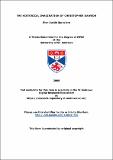Files in this item
The historical imagination of Christopher Dawson
Item metadata
| dc.contributor.advisor | Bentley, Michael John | |
| dc.contributor.author | Sproviero, Glen A. | |
| dc.coverage.spatial | iv, 205 p. | en |
| dc.date.accessioned | 2009-10-23T10:29:16Z | |
| dc.date.available | 2009-10-23T10:29:16Z | |
| dc.date.issued | 2008-11 | |
| dc.identifier.uri | https://hdl.handle.net/10023/760 | |
| dc.description.abstract | Christopher Dawson (1889-1970) was one of his generation's most important historians and religious thinkers, and was a significant influence on many contemporaries including T.S. Eliot, C.S. Lewis, and Russell Kirk. This dissertation is a study of his most fundamental ideas concerning history and culture. Chapter one examines Dawson’s sociological view of history. Convinced that history was more than a scientific enterprise, he believed that the true historian is one who reaches beyond the material world to understand the essence of history’s dynamics. In this way, the world can be conceptualized as a united whole, separated by regional differences as a result of environment, race, material, psychological, and religious factors. Dawson believed that the political histories of the past several centuries failed to grasp the undercurrents of historical change, and that the best way to understand the past is to appreciate culture as an expression of primeval religious traditions. Chapter two treats Dawson’s understanding of progress. Dawson was convinced that progress had become the “working-religion” of our age. This secular faith, founded on scientific rationalism, first pledged to fix the material failures of Western culture, but unwittingly eroded its faith in God, and eventually, its moral fiber. Dawson believed that true progress was progress of the soul in its ordering toward the Creator. Chapter three is a study of Dawson’s Christian, and more specifically, his Catholic beliefs. Informed by religion, his historical and cultural visions are not dogmatic, nor are they polemical. He conceived of history as the unfolding of a divine economy in the temporal world. Although Dawson is a proponent of Roman Catholicism, his scholarship is an objective treatment of history shaped by an undisguised, Christian worldview. Additionally, the appendix is an introduction to Dawson’s life and the circumstances surrounding his conversion to Roman Catholicism. Particular attention is paid to the development of his moral and historical imagination — both of which became intertwined to form the basis of all of his scholarship. | en |
| dc.language.iso | en | en |
| dc.publisher | University of St Andrews | |
| dc.title | The historical imagination of Christopher Dawson | en |
| dc.type | Thesis | en |
| dc.type.qualificationlevel | Doctoral | en |
| dc.type.qualificationname | MPhil Master of Philosophy | en |
| dc.publisher.institution | The University of St Andrews | en |
This item appears in the following Collection(s)
Items in the St Andrews Research Repository are protected by copyright, with all rights reserved, unless otherwise indicated.

